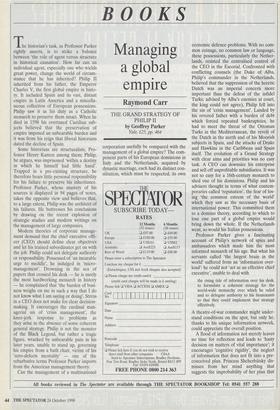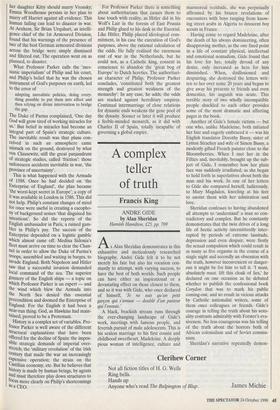BOOKS
Managing a global empire
Raymond Carr
THE GRAND STRATEGY OF PHILIP II by Geoffrey Parker Yale, £25, pp. 464 he historian's task, as Professor Parker rightly asserts, is to strike a balance between `the role of agent versus structure in historical causation'. How far can an individual agent, especially one who wields great power, change the world of circum- stance that he has inherited? Philip II inherited from his father, the Emperor Charles V, the first global empire in histo- ry. It included Spain and its vast, distant empire in Latin America and a miscella- neous collection of European possessions. Philip saw it as his duty as a Catholic monarch to preserve them intact. When he died in 1598 his overtaxed Castilian sub- jects believed that the preservation of empire imposed an unbearable burden and it was from his reign that liberal historians dated the decline of Spain.
Some historians are structuralists, Pro- fessor Henry Kamen among them; Philip, he argues, was imprisoned 'within a destiny in which he himself had little hand'. Trapped in a pre-existing structure, he therefore bears little personal responsibility for his failure to preserve his inheritance. Professor Parker, whose mastery of his sources is displayed in 94 pages of notes, takes the opposite view and believes that, to a large extent, Philip was the architect of his failures. He buttresses his conclusions by drawing on the recent explosion of strategic studies and modern writings on the management of large companies.
Modern theories of corporate manage- ment demand that the chief executive offi- cer (CEO) should define clear objectives and let his trained subordinates get on with the job. Philip could not delegate authority or responsibility. Possessed of 'an incurable urge to meddle', he indulged in 'micro- management'. Drowning in the sea of papers that crossed his desk — he is surely the most hardworking monarch in history — he complained that `the burden of busi- ness weighs on me in such a way that I do not know what I am saying or doing'. Stress in a CEO does not make for clear decision- making. It encourages the cardinal man- agerial sin of `crisis management', the knee-jerk response to problems as they arise in the absence of some coherent general strategy. Philip is not the monster of the Black Legend, but rather a tragic figure, wracked by unbearable pain in his later years, unable to stand up, governing his empire from a bath chair, victim of his 'zero-defects mentality' — one of the rebarbative terms Professor Parker imports from the American management theory.
Can the management of a multinational corporation usefully be compared with the management of a global empire? The com- ponent parts of his European dominions in Italy and the Netherlands, acquired by dynastic marriage, each had its distinct con- stitution, which must be respected, its own economic defence problems. With no com- mon coinage, no common law ,or language, these possessions, particularly the Nether- lands, resisted the centralised control of the CEO in the Escorial. Confronted with conflicting counsels (the Duke of Alba, Philip's commander in the Netherlands, believed that the suppression of the heretic Dutch was an imperial concern more important than the defeat of the infidel Turks; advised by Alba's enemies at court, the king could not agree), Philip fell into the sin of 'crisis management'. Landed by his revered father with a burden of debt which forced repeated bankruptcies, he had to meet the threat of the Ottoman Turks in the Mediterranean, the revolt of the Dutch in the north and of his Moorish subjects in Spain, and the attacks of Drake and Hawkins in the Caribbean and Spain itself. The evolution of a Grand Strategy with clear aims and priorities was no easy task. A CEO can downsize his enterprise and sell off unprofitable subsidiaries. It was not so easy for a 16th-century monarch to shed one of his dominions. Philip and his advisers thought in terms of what contem- poraries called 'reputation', the fear of los- ing 'the common esteem of the world' which they saw as the necessary basis of international power. This committed them to a domino theory, according to which to lose one part of a global empire would bring down the whole. If the Netherlands went, so would his Italian possessions.
' Professor Parker gives a fascinating account of Philip's network of spies and ambassadors which made him the most informed monarch of his age. But what his servants called 'the largest brain in the world' suffered from an 'information over- load': he could not 'act as an effective chief executive', unable to deal with
the rising tide of information over his desk, to formulate a coherent strategy for the world-wide monarchy over which he ruled and to delegate authority to his lieutenants so that they could implement that strategy effectively.
A theatre-of-war commander might under- stand conditions on the spot, but only he, thanks to his unique information network, could appreciate the overall position.
A flood of information not merely leaves no time for reflection and leads to 'hasty decision on matters of vital importance'; it encourages 'cognitive rigidity', the neglect of information that does not fit into a pre- conceived plan. Princess Shcherbatsky dis- misses from her mind anything that suggests the improbability of her plan that her daughter Kitty should many Vronsky; Emma Woodhouse persists in her plan to marry off Harriet against all evidence. This human failing can lead to disaster in war. At Arnhem, Sir Brian Urquhart, as intelli- gence chief of the 1st Armoured Division, found that his warnings of the presence of two of the best German armoured divisions across the bridge were simply dismissed and filtered out. The operation went on as planned, to disaster.
What Professor Parker calls the 'mes- sianic imperialism' of Philip and his court, and Philip's belief that he was the chosen instrument of God's purposes on earth, led to the error of
adopting unrealistic policies, doing every- thing possible to put them into effect and then relying on divine intervention to bridge the gap.
The Duke of Parma complained, 'One day God will grow tired of working miracles for us.' But belief in miracles had become an integral part of Spain's strategic culture. The inevitable result was that plans con- ceived in such an atmosphere came unstuck on the ground, destroyed by what von Clausewitz, still the great panjandrum of strategic studies, called 'friction': those unforeseen accidents inevitable in war, 'the Province of uncertainty'.
This is what happened with the Armada of 1588. Once he had decided on 'the Enterprise of England', the plan became the worst-kept secret in Europe'; a copy of it was available in London in 1586. This did not help. Philip's constant changes of mind for once were useful in creating a cacopho- ly of background noises 'that disguised his intentions'. So did the reports of the English ambassador in Paris, a ruined gam- bler in Philip's pay. The success of the Enterprise depended on a logistic gamble Which almost came off. Medina Sidonia's fleet must arrive on time to clear the Chan- nel in order to allow the Duke of Parma's troops, assembled and waiting in barges, to invade England. Both Napoleon and Hitler saw that a successful invasion demanded local command of the sea. The superior gunnery of the English ships — a topic on Which Professor Parker is an expert — and the wind which blew the Armada into the North Sea denied this essential precondition and doomed the Enterprise of England. For the English it had been a near-run thing. God, as Hawkins had main- tained, proved to be a Protestant. History is a complex set of variables. Pro- fessor Parker is well aware of the different structural explanations that have been offered for the decline of Spain: the impos- sible strategic demands of imperial over- stretch; the 'military revolution' of the 16th Century that made the war an increasingly exPensive operation; the strain on the Castilian economy, etc. But he believes that history is made by human beings, by agents and must therefore play down structures to focus more clearly on Philip's shortcomings as a CEO. For Professor Parker there is something about authoritarians that causes them to lose touch with reality, as Hitler did in his Wolf s Lair in the forests of East Prussia and Philip glued to his desk in the Escorial. Like Hitler, Philip placed ideological com- mitment, in his case the execution of God's purposes, above the rational calculation of the odds. He fully realised the enormous cost of war in the Netherlands, but he could not, as a Catholic king, consent in conscience to abandon the 'great bog of Europe' to Dutch heretics. The authoritari- an character of Philip, Professor Parker concludes, 'constituted both the greatest strength and greatest weakness of the monarchy'. In any case, he adds, the odds are stacked against hereditary empires. Continual intermarriage of close relations for dynastic ends weakens the gene pool of the dynasty. Sooner or later it will produce a feeble-minded monarch, as it did with Charles II of Spain, totally incapable of governing a global empire.



















































































 Previous page
Previous page